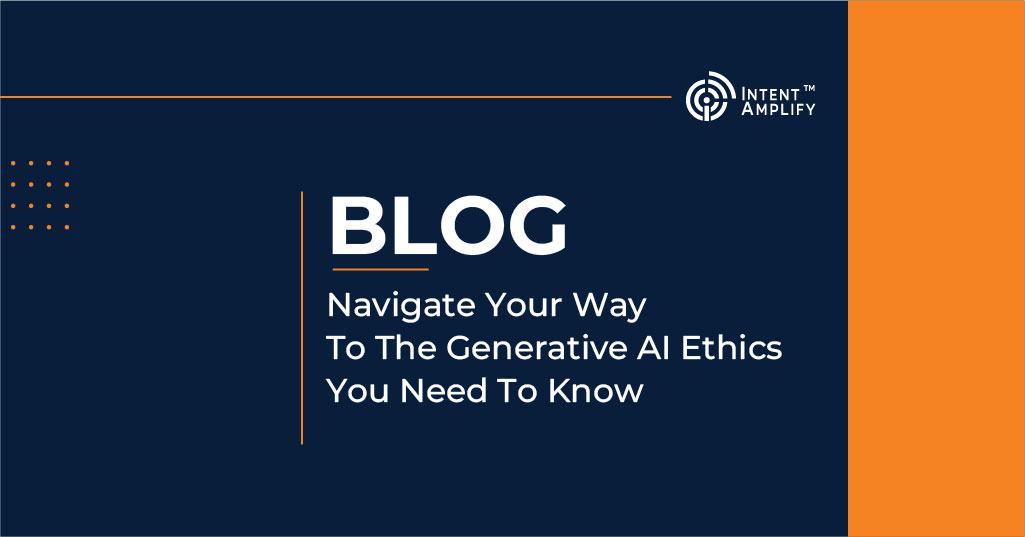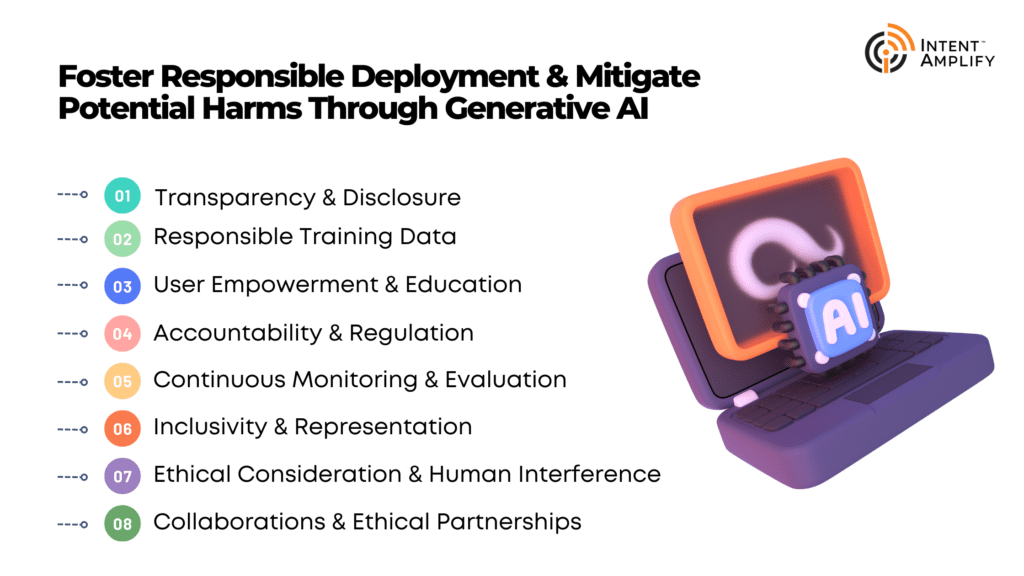
Navigate Your Way To The Generative AI Ethics You Need To Know
Introduction:
In recent years, there have been significant advancements in Generative Artificial Intelligence (AI), enabling machines to independently produce a wide range of content including images, text, music, and videos. The recent advancements have opened up a plethora of opportunities for creativity and innovation. However, it is crucial to acknowledge the ethical implications that come along with these developments. This article explores the domain of generative AI ethics, analyzing the obstacles, apprehensions, and possible remedies related to the ethical implementation of AI-generated material.
What Do You Mean By Generative AI?
The field of artificial intelligence known as generative AI is centered around the creation of autonomously generated content by machines. Deep learning algorithms are a type of generative model. They train on large datasets. This training helps them learn patterns and traits from the data. Generative AI uses this knowledge to create new content. This content often resembles what a human might produce.
Discover The Ethical Concerns in AI & Navigate the Impact of It On Society

1) Bias & Discrimination:
Bias and discrimination are among the key ethical considerations in the field of artificial intelligence. AI algorithms frequently train on datasets that mirror past outputs, which continues and amplifies social disparities.
The presence of gaps between the data-sets can have significant implications on decision-making processes, particularly in areas such as hiring, lending, and judicial areas. This can lead to adverse effects on marginalized communities, further perpetuating discriminatory practices.
2) Transparency & Explainability
The ethical implications of AI systems are brought to the forefront due to the absence of transparency and explainability. Numerous AI models, including deep neural networks, function as opaque systems, rendering it challenging to comprehend their reasoning or forecasts.
The lack of transparency in AI decision-making has become a pressing issue, as it raises questions about accountability. It is essential for individuals impacted by these decisions to have access to the reasoning behind them.
3) Privacy & Data Protection:
In order to achieve accurate predictions, AI systems typically necessitate access to extensive amounts of data. However, it is imperative to carefully consider privacy and data protection measures.
To ensure the safety and confidentiality of personal data, it is imperative to implement stringent security protocols and transparent consent frameworks. This will help prevent any unauthorized access or misuse of sensitive information.
4) Employment Disruption & Economic Inequality:
The increasing prevalence of AI technologies has the capacity to cause significant confusion in conventional employment sectors. Artificial intelligence has the potential to boost efficiency and streamline repetitive duties. However, it could also result in certain occupations being phased out, leading to unemployment for some individuals.
AI technology raises ethical concerns about its impact on workers and the potential worsening of economic inequality if we do not distribute its benefits equitably.
5) Autonomy & Responsibility:
The emergence of AI-enabled autonomous systems has given rise to a host of intricate ethical considerations. For instance, self-driving cars are required to make quick decisions that may have critical implications, such as life or death situations.
The ethical considerations surrounding the prioritization of various outcomes by AI systems, such as the safety of passengers versus pedestrians, are complex and require thoughtful analysis.
6) Accountability & Liability:
The ethical issue of assigning responsibility and legal liability in situations where AI systems cause harm or produce inaccurate outcomes is currently a significant concern.
As the complexity of AI continues to grow, traditional legal frameworks may face challenges in keeping up. This highlights the need for the establishment of new regulations and policies that can assign responsibility for incidents related to AI accordingly in all aspects.
7) Ethical Considerations & Fairness:
We must design AI systems with ethical considerations and promote fairness. Incorporating ethical considerations throughout the entire development lifecycle is crucial. This includes taking into account ethical considerations during data collection, algorithm design, testing, and deployment.
It is imperative for developers and organizations to give utmost importance to fairness, transparency, and inclusivity. This is crucial in order to prevent the amplification of social biases or the creation of unjust advantages.
8) Dual-Use & Autonomous Weapon:
The implementation of AI in military operations has given rise to ethical considerations regarding the deployment of autonomous weaponry.
The absence of human oversight in decision-making procedures and the possibility of unforeseen outcomes or heightened conflict call for a meticulous assessment of the ethical ramifications and the creation of global standards.
Foster Responsible Deployment & Mitigate Potential Harms Through Generative AI

1) Transparency & Disclosure:
The ethical implementation of generative AI demands utmost transparency. It is imperative for developers and organizations to be transparent about their use of AI-generated content.
This will enable users to be fully informed about the nature and source of the content they are interacting with. Fostering trust and enabling individuals to make informed decisions about the content they consume is crucial.
2) Responsible Training Data
The process of selecting and curating training data is crucial in mitigating biases and ensuring equity in generative AI systems.
It is essential to give thorough thought to the sources and caliber of training data to guarantee that it embodies a wide range of perspectives and refrains from reinforcing detrimental stereotypes or biases. Preprocessing techniques can be leveraged to address any biases that may exist within the data.
3) User Empowerment & Education
It is crucial to empower users with the ability to comprehend and recognize content that has been generated by AI. Offering users with tools and technologies that aid in distinguishing between genuine and AI-generated content can play a significant role in fostering a more knowledgeable and perceptive audience.
Incorporating education on the capabilities and limitations of generative AI systems can encourage responsible consumption and critical thinking among users.
4) Accountability & Regulation
In order to ensure the ethical implementation of generative AI, it is imperative to establish unambiguous guidelines and standards. Governments, organizations, and industry experts can collaborate to develop regulatory frameworks that govern the deployment of generative AI systems.
Regulations may cover a range of areas, including but not limited to safeguarding data privacy, ensuring the authenticity of content, and preventing any malicious use.
5) Continuous Monitoring & Evaluation
By conducting routine monitoring and evaluation of generative AI systems, potential ethical issues can be detected and addressed promptly. Incorporating feedback mechanisms, establishing reporting channels, and subjecting operations to public scrutiny are all essential components in promoting accountability and ensuring responsible deployment.
It is crucial to closely monitor the results and effects of generative AI systems and make essential modifications to minimize any potential negative consequences.
6) Inclusivity & Representation
It is of utmost importance to prioritize the promotion of inclusivity and representation in the field of generative AI. It is imperative to make conscious efforts towards ensuring that the training data is inclusive of diverse voices, cultures, and perspectives.
Implementing this approach can reduce the creation of content that marginalizes or discriminates against certain groups, leading to a more inclusive and fair AI environment.
7) Ethical Consideration & Human Interference
Incorporating ethical considerations during the design and development phases of generative AI systems is of utmost importance. It is imperative to incorporate human interference in the training and generation processes to guarantee the adherence to ethical principles.
The involvement of human reviewers is crucial in ensuring that AI-generated content adheres to ethical standards. These reviewers offer valuable guidance and intervene when necessary to maintain the integrity of the content.
8) Collaborations & Ethical Partnerships:
The promotion of ethical use of generative AI heavily relies on the collaboration among stakeholders. Multidisciplinary collaborations between researchers, policymakers, industry experts, and ethicists are crucial for addressing and discussing ethical challenges.
By fostering ethical partnerships, organizations can promote the exchange of knowledge, share best practices, and collaboratively develop guidelines that incorporate a wide range of perspectives.
Wrapping Up!
The emergence of generative AI has paved the way for a revolutionary transformation across multiple industries, opening up new avenues for creative exploration and innovation. Nevertheless, it is crucial to acknowledge the ethical implications associated with its implementation.
Through the implementation of transparent practices, the mitigation of biases, and the fostering of user empowerment, we can effectively navigate the intricate terrain of generative AI ethics. This approach allows you to harness the technology’s potential while simultaneously safeguarding against any potential negative consequences. By adopting ethical principles, you can pave the way for a future where generative AI promotes creativity, inclusivity, and societal advancement.




